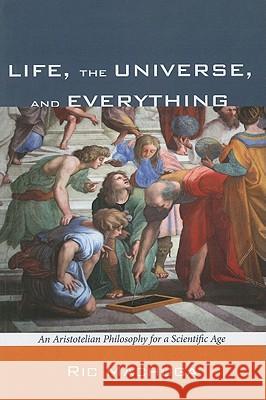Life, the Universe, and Everything: An Aristotelian Philosophy for a Scientific Age » książka
Life, the Universe, and Everything: An Aristotelian Philosophy for a Scientific Age
ISBN-13: 9781608998128 / Angielski / Miękka / 2011 / 326 str.
Life, the Universe, and Everything: An Aristotelian Philosophy for a Scientific Age
ISBN-13: 9781608998128 / Angielski / Miękka / 2011 / 326 str.
(netto: 145,60 VAT: 5%)
Najniższa cena z 30 dni: 151,62
ok. 16-18 dni roboczych.
Darmowa dostawa!
--Has modern science made philosophy obsolete? --Is the soul real? --Do we have a free will? --Why should we be moral? --Does God exist, and if so, why is there so much pain and suffering in the world? --What is the relation between faith and reason? Ric Machuga takes a holistic approach to these questions. No philosophical idea, no matter how small, can live alone. Ideas always gain their force, power, and life from their surroundings--their "ecosystem." The ecosystem of ideas defended in this book comes from the ancient Greek philosopher Aristotle and his medieval interpreter, Thomas Aquinas. The ongoing relevance of their philosophical thought to twenty-first century issues is opened up in fascinating ways. Life, the Universe, and Everything is the product of thirty years of teaching introductory courses in philosophy. Assuming no prior background, it only requires of readers an enquiring mind and a willingness to think carefully. An ideal guide to the big questions we face.
Synopsis:--Has modern science made philosophy obsolete? --Is the soul real? --Do we have a free will? --Why should we be moral? --Does God exist, and if so, why is there so much pain and suffering in the world? --What is the relation between faith and reason? Ric Machuga takes a holistic approach to these questions. No philosophical idea, no matter how small, can live alone. Ideas always gain their force, power, and life from their surroundings--their "ecosystem." The ecosystem of ideas defended in this book comes from the ancient Greek philosopher Aristotle and his medieval interpreter, Thomas Aquinas. The ongoing relevance of their philosophical thought to twenty-first century issues is opened up in fascinating ways. Life, the Universe, and Everything is the product of thirty years of teaching introductory courses in philosophy. Assuming no prior background, it only requires of readers an enquiring mind and a willingness to think carefully. An ideal guide to the big questions we face.Endorsements:"Ideas always exist in an ecosystem. Patiently unpacking this simple but powerful truth with the skill of a master teacher, Ric Machuga has written a book as wise as it is winsomely modest."--John WilsonEditor, Books & Culture"This is a clearly written, wonderfully engaging account of Aristotelianism for our contemporary world. It is, in short, a defense of `first philosophy, the idea that philosophy and philosophical reflection is the starting point of, and that which illuminates and clarifies, all that we believe that we know in the other disciplines in the university, especially the hard sciences. I applaud Professor Machuga for this outstanding book."--Francis J. BeckwithProfessor of Philosophy and Church-State StudiesBaylor University"Modestly but engagingly written, and yet ambitious in scope, this Aristotelian tour of the great loci of philosophy is a tour de force. It is the fruit, not of quickly-written research, but of many years teaching of primary, classic texts, and it shows. A careful reading will provide a philosophical education, in the old-fashioned sense of that word. The reader will put the book down both better informed, and wiser."--Paul HelmRegent College, Vancouver, BCAuthor Biography:Ric Machuga has taught philosophy and in the Honor Program at Butte College for thirty years. He is the author of In Defense of the Soul (2002) and numerous pieces for Books and Culture.











